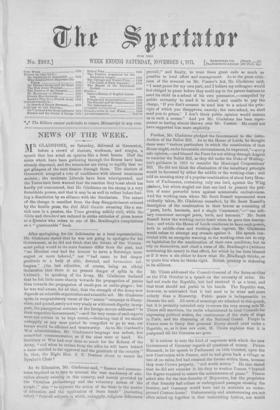After apologizing for his deficiencies as a local representative, Mr.
Gladstone stated that he was not going to apologize for his G-overnment, as he did not think that the future of the Govern- ment policy would in its main features differ from the past, and "no Minister ever had the honour to serve a Sovereign more august or more beloved," nor " had cause to feel deeper gratitude to a body of able, devoted, and harmonious col- leagues " (the last adjective, of course, being an official declaration that there is no present danger of splits in the Cabinet). In speaking of the Army, Mr. Gladstone declared that he felt little more charity towards the propagation of panics than towards the propagation of small-pox or cattle-plague ; but he was well aware, for all that, that the strength of the Army now depends on scientific organization and scientific aid. Mr. Gladstone 13poke in congratulatory terms of the" mimic " campaign in Hamp- shire, and quoted,surely not very wisely or with much dignity, in sup- port, the panegyrical criticism of the foreign envoys addressed "to their respective Governments,"—as if the very cream of such reports were net certain to be kept secret,—declaring that if we should unhappily at any near period be compelled to go to war, our troops would be efficient and trustworthy. As to Mr. Cardwell's War administration, Mr. Gladstone's language was ardent, but somewhat commemorative, as if the close were at hand. No Secretary at War had ever done so much for the Reform of the Army, "and when he retires from the office he will leave behind a name entitled to the approval and the gratitude of the country." Is, then, the Right Hon. J. E. Denison about to vacate the b'pealter's Chair ?


































